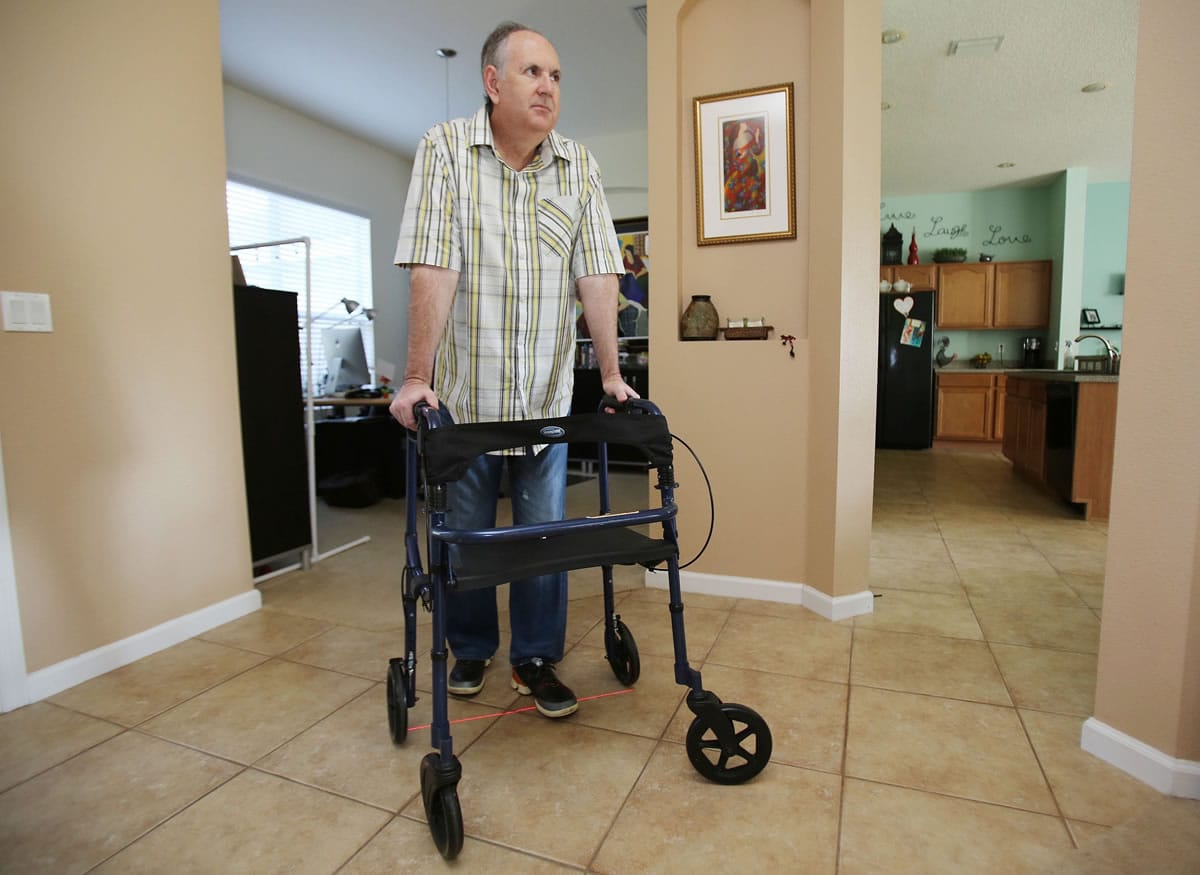ORLANDO, Fla. — Everyone knows walking is good exercise, but it has another benefit: a daily 20-minute walk can also cut the risk of dementia by 40 percent, studies show.
Taking those findings a step further, neurologists at Jacksonville, Fla.’s Mayo Clinic are studying whether getting patients immobilized by disease to walk can also help stave off mental decline.
Dr. Jay Van Gerpen, a neurologist who specializes in gait, is recruiting Parkinson’s patients for a study to help them stay on their feet and retain brain health.
“Walking is a window to the brain,” said Van Gerpen. Regular walking not only helps preserve brain function in healthy people, but also protects against further damage caused by dementia, Alzheimer’s and diseases like Parkinson’s, a degenerative disease that causes tremors, motor impairment and cognitive decline.
When someone’s gait changes – steps get shorter or pace slows – that frequently indicates the brain is damaged. Thus, walking problems are common in those with dementia and Parkinson’s, because these conditions cause brain cells to die.
Walking not only slows that progression, but helps brain cells recover by forming new connections, Van Gerpen said.
Van Gerpen invented a laser device several years ago that helps Parkinson’s patients walk better.
The device attaches to walkers or canes and shoots a red laser beam in front of the person walking. Visual cues can help Parkinson’s patients walk without freezing. When patients focus on stepping over the line, they access the visual part of the brain, which bypasses the motor output area that isn’t working, Van Gerpen said.
The device was a game-changer for Wayne Puckett of Clermont, Calif. Four years ago, the 48-year-old started having tremors, followed by difficulty walking and memory problems.
Puckett said gait freezing was the biggest issue. “I would just come to a halt, especially at doorways,” he said. The former postal worker used to be able to memorize two zip codes worth of street addresses, but that ability was gone.
In March 2010, he went to the Mayo Clinic in Jacksonville, where Dr. Van Gerpen diagnosed him with a form of Parkinson’s and gave him a Mobilaser that attaches to his walker.
The first time Puckett used the Mobilaser, which is now distributed worldwide and costs $400, he couldn’t believe the difference. “I was almost walking like normal. I was in sheer amazement. It still amazes me.”
It helped in other ways, too.
“When I wasn’t able to move as much, I noticed my brain was much worse,” Puckett said. “With the laser I can move, get around, and am definitely able to concentrate better.”
In a 2012 study, Van Gerpen’s team studied a small group of Parkinson’s patients who had difficulty walking. By using the laser, they cut in half both the time it took them to walk a course, and the number of times they came to a halt, said Van Gerpen. His new study aims to prove that the laser helps patients walk every day, over months and years.
“Getting these patients walking is extremely helpful because it helps the brain’s blood flow and reduces mental and muscle decline,” said Dr. Nizam Razack, a neurosurgeon at Florida Hospital Celebration Health who performs brain surgery on Parkinson’s patients to help improve their motor impairment.
But beyond helping those with Parkinson’s, a daily walk has broader implications for Americans who are developing dementia at an epidemic rate, said Van Gerpen.
Dementia is on the rise not just because Americans are living longer, but because they have so much vascular disease. “Dementia is related to obesity, high blood pressure and diabetes,” he said. All these conditions impair blood flow to the brain.
“When blood flow in a large vessel to the brain gets blocked, a person has a stroke,” said Van Gerpen. “When small vessels get blocked, brain tissue also dies. You just don’t notice it at that moment.”
Walking reduces the risk of small vessel damage. That will delay the onset of dementia and help protect what function is left.



